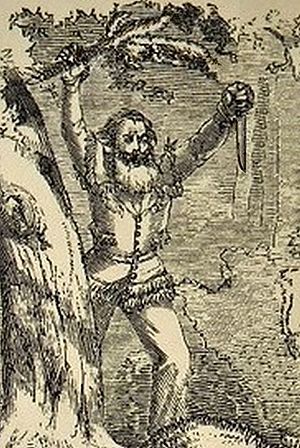John Turner (fur trapper) facts for kids
Quick facts for kids
John Turner
|
|
|---|---|

John Turner defending his camp in 1835
|
|
| Born | 1807 |
| Died | 1847, 39 or 40 years old |
| Cause of death | Ballistic trauma |
| Occupation | Fur trapper Guide |
| Years active | 1823 – 1847 |
| Known for | Umpqua massacre Willamette Cattle Company |
| Parent(s) | Smithton Turner and Nancy Ragsdale |
John Turner (1807 – 1847) was an American fur trapper and guide. He first arrived in the Oregon Country in 1828. He became one of the first settlers in the Willamette Valley. Later, he moved to California. There, he helped with the second rescue attempt for the Donner Party.
Contents
Early Life of John Turner
Turner was born in Madison County, Kentucky in 1807. His parents were Smithton Turner and Nancy Ragsdale. By 1823, when he was just 16, he began working in the fur trade. He worked in the Rocky Mountains.
Surviving Attacks: Mojave and Umpqua
Journey to California and Oregon
In 1827, John Turner joined a group of fur trappers. They were led by Jedediah Smith. Their goal was to travel from the Rocky Mountains back to California. They followed a route Smith had taken before.
While crossing the Colorado River, their group faced an attack. Ten trappers were killed. John Turner and Jedediah Smith were among the survivors. They eventually met up with another group. Together, 18 people continued north into the Oregon Country.
The Umpqua River Incident
In June 1828, the group began trading with the Lower Umpqua people. On July 14, 1828, John Turner, Jedediah Smith, and two others were away from their camp. While they were gone, the camp was attacked.
Turner, Smith, and the others avoided the attack. They traveled north to Fort Vancouver. They arrived after 28 days. Another survivor, Arthur Black, had arrived two days earlier. It was later confirmed that 15 men from their group had died. John Turner was one of only two men to survive both major attacks.
Working with the Hudson's Bay Company
Guiding Trapping Trips
After the attacks, John Turner and Richard LeLand stayed at Fort Vancouver. In the spring of 1829, Jedediah Smith and Arthur Black left. Turner then joined the Hudson's Bay Company (HBC). He worked as a guide for their trapping trips into California.
In 1832, Turner was with a large HBC group in California. He met Ewing Young there. Turner then left the HBC and joined Young's team.
The Rogue River Incident
In June 1835, Turner was leading a small group of eight pioneers. They were traveling from California to Oregon. The group included William J. Bailey and George K. Gay. There was also a woman and two children, believed to be Turner's family.
Their group was attacked near the Rogue River. During the escape, Turner used a burning log to defend himself. Only Turner, Woodsworth, Bailey, and Gay survived the attack.
The Willamette Cattle Company
In 1837, John Turner joined the Willamette Cattle Company. This group included Gay and Bailey. They sailed to California to buy cattle. Their goal was to bring hundreds of cattle back to the Willamette Valley. Ewing Young led this cattle drive.
The journey was very difficult. The group bought 729 cattle and some horses. They began herding them north. Along the way, they faced many challenges. They eventually delivered 630 cattle to the Willamette Valley settlement.
The Memorial of 1838
Seeking U.S. Control
In the 1830s, settlers in the Willamette Valley wanted the United States to take control of the Oregon Country. The Hudson's Bay Company had set up a government loyal to British interests. Many American settlers wanted the U.S. to have legal and military power over the land.
A petition was created in 1838. It was called the Memorial of 1838. Jason Lee prepared it. Thirty-six Willamette Valley settlers signed the petition. John Turner was the last person to sign it.
Early Government Efforts
The Memorial of 1838 was signed three years before the Champoeg Meetings. Some historians believe Turner helped create the Provisional Government of Oregon at Champoeg. However, his name is not listed among the voters.
Later Life in California
After the Provisional Government was formed, Turner sold his property. He sold it to John Phillips for $100. Then, he moved to California.
In 1847, John Turner helped with a rescue mission. He was part of the second attempt to rescue the Donner Party. This group of pioneers had become stranded in the Sierra Nevada mountains.
Remembering John Turner
John Turner died in 1847 in California. He was 39 or 40 years old. His death was caused by an accidental discharge of his own rifle.
J. W. Nesmith, a president of the Oregon Pioneer Association, spoke about Turner in 1882. He called Turner "the old Kentucky giant." Nesmith remembered him for his great strength, good nature, and courage. Turner was well-known across the Rocky Mountains, New Mexico, California, and Oregon.
Turner's Oregon Pioneer Registry card at the Oregon Historical Society also mentions him. It states he was born in Kentucky and came to Oregon in 1828. It notes his survival of the 1828 attack near the Umpqua River. It also confirms his long career as a trapper and his accidental death in 1847.
Images for kids
 | John T. Biggers |
 | Thomas Blackshear |
 | Mark Bradford |
 | Beverly Buchanan |


